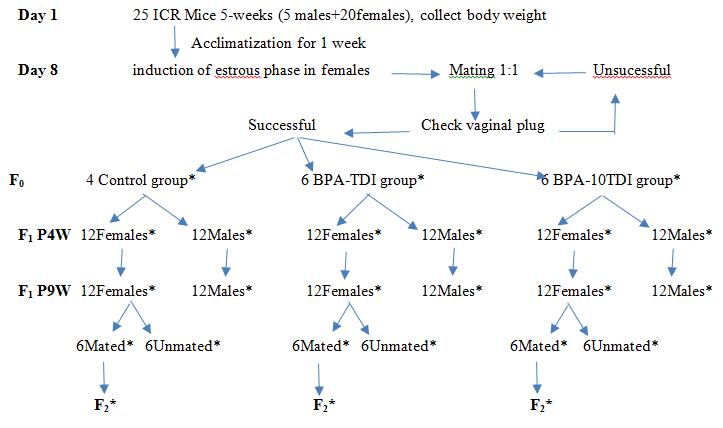
Effects of Continuous Exposure to Bisphenol A on Male and Female Mice from Prenatally to Adulthood
Abstract
BisphenolA (BPA), a monomer estrogenic chemical of many plastic products has controversial biological effects. This study assessed the effects at 0.05 mg/kg BW/day (Tolerable Daily Intake, TDI) and 0.5 mg/kg BW/day (10TDI), in male and female mice continuously exposed from embryo to adulthood. Results found BPA at the expected safe dose (TDI) decreased anogenital distance index (AGDI), motile sperm count, ejaculation frequency, increased cauda epididymis weight, ejaculation latency in male mice, increased lordosis quotient in female mice. 10TDI decreased motile sperm counts, intromission latency, unable to perform ejaculation in male mice, and shortened AGDI in female mice. Other systems, at TDI, male mice had increased aggressive scores. At 10TDI, both male and female mice had increased body weights at 4 weeks and aggressive scores at 8-9 weeks. Mated female mice had increased internal organ weights at 13 weeks after pup delivery. The effects on reproductive and related systems were confirmed.
Full Text:
61-69:PDFReferences
National Toxicology Program, U.S. Department of Health and Human Services. (2008). NTP-CERHR
monograph on the potential human reproductive and developmental effects of Bisphenol A. Retrieved November 22, 2015, from https://ntp.niehs.nih.gov/ntp/ohat/bisphenol/bisphenol.pdf
Toxics Link. (2014). Toxic BPA chemical found in baby feeding bottles. Retrieved November 22, 2015, from http://toxicslink.org/?q=article/toxic-bpa-chemical-found-baby-feeding-bottles
U.S. Food and Drug Administration. (2014). Bisphenol A (BPA): Use in Food Contact Application.
Retrieved November 22, 2015, from http://www.fda.gov/Food/IngredientsPackagingLabeling/FoodAdditivesIngredients/ucm064437.htm
European Food Safety Authority (EFSA). (2015). Scientific opinion on BPA. Retrieved November 22, 2015 from http://www.efsa.europa.eu/sites/default/files/corporate_publications/files/factsheetbpa150121.pdf
European Food Safety Authority (EFSA). (2011). Statement on the ANSES reports on Bisphenol A. EFSA
Journal 2011; 9(12): 2475.
Sattayasai J, Srisuwan S, Arkaravichien T, Aromdee C. Effects of andrographolide on sexual
functions, vascular reactivity and serum testosterone level in rodents. Food Chemical Toxicol 2010; 48: 1934-1938.
Clark RL, Antonello JM, Grossman SJ, Wise LD, Anderson C, Bagdon WJ, Prahalada S, MacDonald JS, Robertson RT. External genitalia abnormalities in male rats exposed in utero to finasteride, a 5 alpha - reductase inhibitor. Teratology 1990; 42: 91-100.
Xu LC, Sun H, Chen JF, Bian Q, Qian J, Song L, Wang XR (2005). Evaluation of androgen receptor transcriptional activities of bisphenol a, octylphenol and nonylphenol in vitro. Toxicology 216(2-3): 197-203.
Lee HJ, Chattopadhyay S, Gong EY, Ahn RS, Lee KS. Antiandrogenic effects of bisphenol a and nonylphenol on the function of androgen receptor. Toxicol Sci 2003; 75: 40-46.
Wolstenholme JT, Rissman EF, Connelly JJ. (2011). The role of bisphenol a in shaping the brain, epigenome and behavior. Horm Behav 59: 296-305.
Alonso-Magdalena, P; Ropero, AB; Soriano, S; García-Arévalo, M; Ripoll, C; Fuentes, E; Quesada, I; Nadal, Á. "Bisphenol-A acts as a potent estrogen via non-classical estrogen triggered pathways.". Mol Cell Endocrinol 2012; 355 (2): 201–7. doi:10.1016/j.mce.2011.12.012. PMID 22227557.
Welshons WV, Thayer KA, Judy BM, Taylor JA, Curran EM, vom Saal FS. (2003). Large effects from small exposures. I. Mechanisms for endocrine-disrupting chemicals with estrogenic activity. Environ Health Perspect 111(8): 994-1006.
Kobayashi K, Kubota H, Ohtani K, Hojo R, Miyakawa M. (2012). Lack of effects for dietary exposure of bisphenol a during in utero and lactational periods on reproductive development in rat offspring. J Toxicol Sci 37(3): 565-573.
Miao M, Yuan W, He Y, Zhou Z, Wang J, Gao E, Li G, Li DK. In utero exposure to bisphenol-a and anogenital distance of male offspring. Birth Defects Res A Clin Mol Teratol 2011; 91(10): 867-872.
Jasarevic E, Sieli PT, Twellman EE, Welsh Jr TH, Schachtman TR, Roberts RM, Geary DC, Rosenfeld CS. (2011). Disruption of adult expression of sexually selected traits by developmental exposure to Bisphenol A. Proc Natl Acad Sci U S A. 2011; 108 (28): 11715-11720.
Jones BA, Shimell JJ, Watson NV. (2011). Pre- and postnatal bisphenol a treatment results in persistent
deficits in the sexual behavior of male rats, but not female rats, in adulthood. Horm Behav 59: 246-251
Li DK, Zhou Z, Miao M, He Y, Qing D, Wu T, Wang J, Weng X, Ferber J, Herrinton LJ, Zhu Q, Gao E, Yuan W. Relationship between urine bisphenol-a level and declining male sexual function. J Androl 2010; 31(5): 500-506.
Kawai K, Nozaki T, Nishikata H, Aou S, Takii M, Kubo C. Aggressive behavior and serum
testosterone concentration during the maturation process of male mice: the effects of fetal exposure to bisphenol a. Environ Health Perspect 2003; 111: 175-178.
Stachenfeld, NS. Sex hormone effects on body fluid regulation. Exerc Sport Sci Rev 2008; 36(3):
-159.
Walsh, B. (2010). The Perils of Plastic – Environmental Toxins – Toxic plastic. Time (April 01, 2010).
Retrieved November 22, 2015, from http://content.time.com/time/specials/packages/article/0,28804,1976909_1976908_1976938-2,00.html
Woodruff, T J. (2011). 99% of pregnant women in US test positive for multiple chemicals including banned
ones, study suggests. Environ Health Perspect 119 (6). ScienceDaily. pp. 878–885. doi:10.1289/ehp.1002727. Retrieved 1 February 2012.
Vogel, S A. The Politics of Plastics: The Making and Unmaking of Bisphenol A "Safety". Am J Public Health 2009; 99(S3): S559–S566.
Birnbaum LS, Aungst J, Schug TT, Goodman JL Working together: Research- and scientific-based
regulation of BPA. Environ Health Perspect 2013; 121 (7): A206–A207. doi:10.1289/ehp.1306963. PMID 23817036. Retrieved 2014-02-01.
Chatsantiprapa, K., Srihan, S., Navakoksri, R., Kunthaprom, N. (2013). Risk assessment of Bisphenol A
migration from baby feeding bottle. KKU Res. J. 2013; 18(6):1021-1025.
Refbacks
- There are currently no refbacks.

